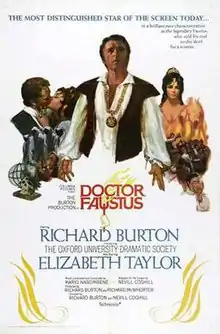| Doctor Faustus | |
|---|---|
 Theatrical release poster | |
| Directed by | Richard Burton Nevill Coghill |
| Screenplay by | Nevill Coghill |
| Based on | The Tragical History of Doctor Faustus by Christopher Marlowe |
| Produced by | Richard Burton Richard McWhorter |
| Starring |
|
| Cinematography | Gábor Pogány |
| Edited by | John Shirley |
| Music by | Mario Nascimbene |
| Color process | Technicolor |
Production companies |
|
| Distributed by | Columbia Pictures |
Release dates |
|
Running time | 93 minutes[1] |
| Country | United Kingdom |
| Languages | English Latin |
Doctor Faustus is a 1967 British horror film adaptation of the 1588 Christopher Marlowe play The Tragical History of Doctor Faustus directed by Richard Burton and Nevill Coghill. The first theatrical film version of a Marlowe play, it was the only film directed by Burton or Coghill, Burton's Oxford University mentor.[2] It starred Burton as the title character Faustus, with Elizabeth Taylor appearing in a silent role as Helen of Troy. The film is a permanent record of a stage production that Burton starred in and staged with Coghill at the Oxford University Dramatic Society in 1966. Burton would not appear on stage again until he took over the role of Martin Dysart in Equus on Broadway ten years later.
Plot
University of Wittenberg scholar Faustus earns his doctorate, but his insatiable craving for knowledge and power leads Faustus to try his hand at necromancy in an attempt to conjure Mephistopheles out of hell. Signing the pact in his own blood, Faustus bargains his soul to Lucifer in exchange for 24 living years with Mephistopheles as his slave. Mephistopheles proceeds to reveal to Faustus the works and doings of the Devil.
Cast
- Richard Burton as Doctor Faustus
- Elizabeth Taylor as Helen of Troy
Of the Oxford University Dramatic Society, Queen's College, Oxford, England:
- Andreas Teuber as Mephistopheles
- Ram Chopra as Valdes
- Richard Carwardine as Cornelius
- Patrick Barwise as Wagner
- Michael Meneaugh as Good Angel / Bishop
- Richard Durden as Evil Angel / Knight (credited as Richard Durden-Smith)
- David McIntosh as Lucifer
- Jeremy Eccles as Beelzebub
- Gwydion Thomas as Lechery
- Ian Marter as Pride / Emperor
- Nicholas Loukes as Envy / Cardinal of Lorraine
- Adrian Benjamin as Pope
- Elizabeth O'Donovan as Empress
With:
- Ambrose Coghill as Avarice
- Maria Aitken as Sloth (uncredited)
- Hugh Williams as Scholar
Reception
Reviews of the staged version in the British press were "less than enthusiastic", with critics commenting "a sad example of university drama at its worst", with an uninspired Burton "walking through the part". Taylor was "undeniably decorative, but there was nothing much to say about her acting ability".[3] The movie received a terribly negative review in The New York Times, Renata Adler criticizing the adaptation of the text ("the play has been quite badly cut"), Burton's performance ("he seems happiest shouting in Latin, or in Ms. Taylor's ear"), the score ("some horrible electronic Wagnerian theme music"), and Taylor's role ("in this last role [Alexander's paramour], she is, for some reason, frosted all over with silver—like a pastry, or a devaluated refugee from Goldfinger[4]"), reserving praise only for Teuber's performance ("one fine, very pious performance").[5]
References
- ↑ "DOCTOR FAUSTUS (X)". British Board of Film Classification. 26 July 1967. Retrieved 19 November 2012.
- ↑ Bevington, David (2010). "The Performance History". In Sara Munson Deats (ed.). Doctor Faustus: A Critical Guide. A&C Black. pp. 41–71. ISBN 9781847061386.
- ↑ Lewis, Anthony (16 February 1966). "Dr. Faustus Gets Cool a Welcome: British Reviewers Criticize the Burtons and the Play". The New York Times. p. 49.
- ↑ One of the memorable visual images in the James Bond film Goldfinger, produced three years before Doctor Faustus, was the film villain's habit of covering women with gold.
- ↑ Adler, Renata (7 February 1968). "Screen: Faustus Sells His Soul Again: Burtons and Oxford Do the Devil's Work; Adaptation of Marlowe Play at 2 Theaters". The New York Times. p. 38.